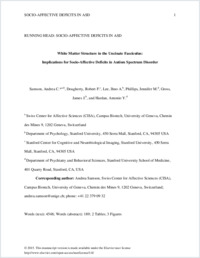White matter structure in the uncinate fasciculus: Implications for socio-affective deficits in Autism Spectrum Disorder
IPC
- Samson, Andrea C. ORCID Swiss Center for Affective Sciences, University of Geneva, Geneva, Switzerland. Department of Psychology, Stanford University, Stanford, California, USA
- Dougherty, Robert F. Stanford Center for Cognitive and Neurobiological Imaging, Stanford University, Stanford, California, USA
- Lee, Ihno A. Department of Psychology, Stanford University, Stanford, California, USA
- Phillips, Jennifer M. Department of Psychiatry and Behavioral Sciences, Stanford University School of Medicine, Stanford, California, USA
- Gross, James J. Department of Psychology, Stanford University, Stanford, California, USA
- Hardan, Antonio Y. Department of Psychiatry and Behavioral Sciences, Stanford University School of Medicine, Stanford, California, USA
- 13.08.2016
Published in:
- Psychiatry Research: Neuroimaging. - Elsevier BV. - 2016, vol. 255, p. 66-74
Autism Spectrum Disorder
social deficits
emotion regulation
uncinate fasciculus
Diffusion Tensor Imaging
English
Individuals with Autism Spectrum Disorder (ASD) have social and communication deficits and
difficulties regulating emotions. The brain bases of these socio-affective deficits are not yet
clear, but one candidate is structural connectivity in the left uncinate fasciculus, which connects
limbic temporal and frontal areas thought to be involved in socio-affective processing. In this
study, we assessed white matter structure in the left and right uncinate fasciculus in 18 highfunctioning
individuals with ASD and 18 group-matched typically developing (TD) controls
using Diffusion Tensor Imaging. To test specificity of the associations, we also examined the
association between both uncinate fasciculi and restricted and repetitive behaviors. Compared to
TD individuals, individuals with ASD had significantly lower fractional anisotropy (FA) in the
left and right uncinate. Group status significantly moderated the association between left
uncinate and socio-affective deficits, indicating that within the ASD group, FA was associated
with socio-affective deficits: Individuals with ASD with lower FA in the left uncinate had
significantly more social and emotion regulation deficits. There was no association with
restricted and repetitive behaviors. This study provides evidence that the left uncinate may play a
critical role in socio-affective skills in individuals with ASD.
difficulties regulating emotions. The brain bases of these socio-affective deficits are not yet
clear, but one candidate is structural connectivity in the left uncinate fasciculus, which connects
limbic temporal and frontal areas thought to be involved in socio-affective processing. In this
study, we assessed white matter structure in the left and right uncinate fasciculus in 18 highfunctioning
individuals with ASD and 18 group-matched typically developing (TD) controls
using Diffusion Tensor Imaging. To test specificity of the associations, we also examined the
association between both uncinate fasciculi and restricted and repetitive behaviors. Compared to
TD individuals, individuals with ASD had significantly lower fractional anisotropy (FA) in the
left and right uncinate. Group status significantly moderated the association between left
uncinate and socio-affective deficits, indicating that within the ASD group, FA was associated
with socio-affective deficits: Individuals with ASD with lower FA in the left uncinate had
significantly more social and emotion regulation deficits. There was no association with
restricted and repetitive behaviors. This study provides evidence that the left uncinate may play a
critical role in socio-affective skills in individuals with ASD.
- Faculty
- Faculté des lettres et des sciences humaines
- Department
- Département de Pédagogie spécialisée
- Language
-
- English
- License
-
Rights reserved
- Open access status
- bronze
- Identifiers
-
- DOI 10.1016/j.pscychresns.2016.08.004
- ISSN 0925-4927
- Persistent URL
- https://folia.unifr.ch/unifr/documents/325764
Statistics
Document views: 71
File downloads:
- samsonetal.2016.whitematterstructureintheuncinatefasciculus..._av3899: 100
